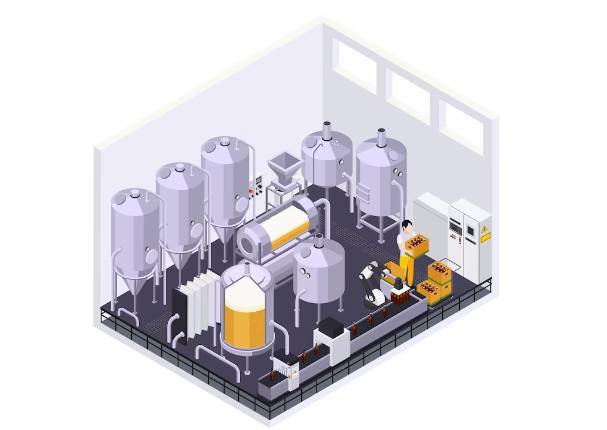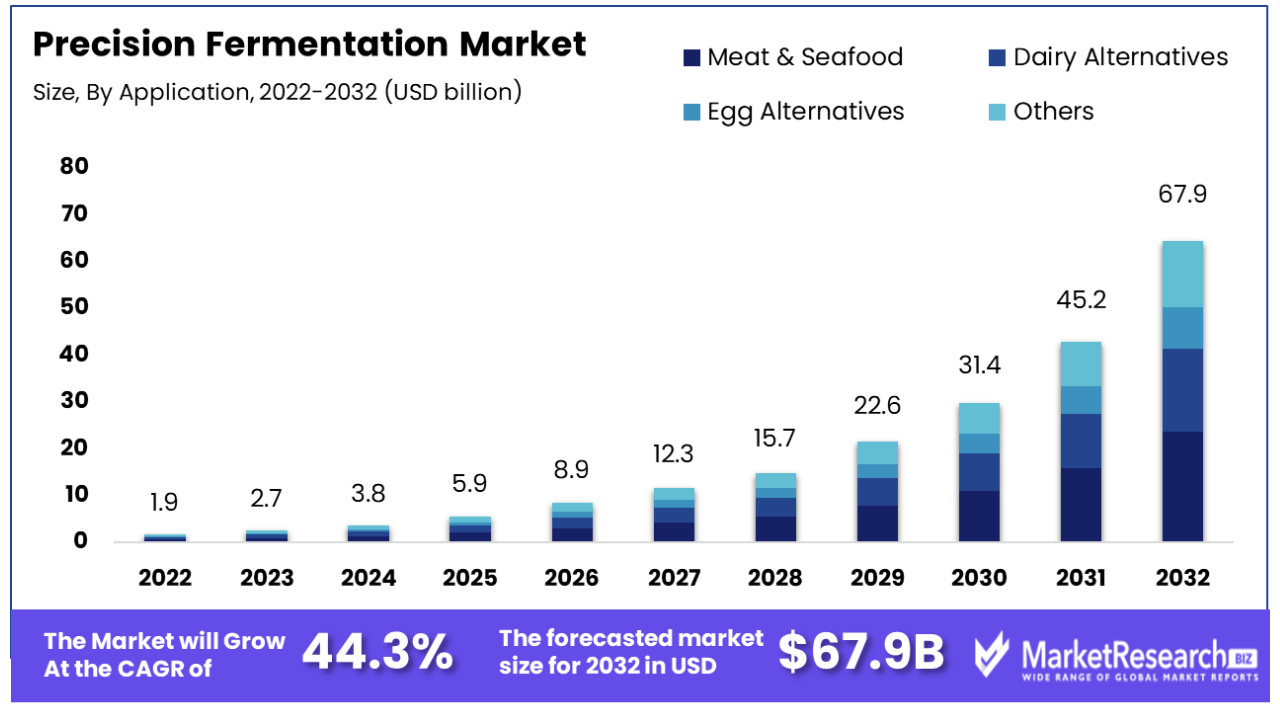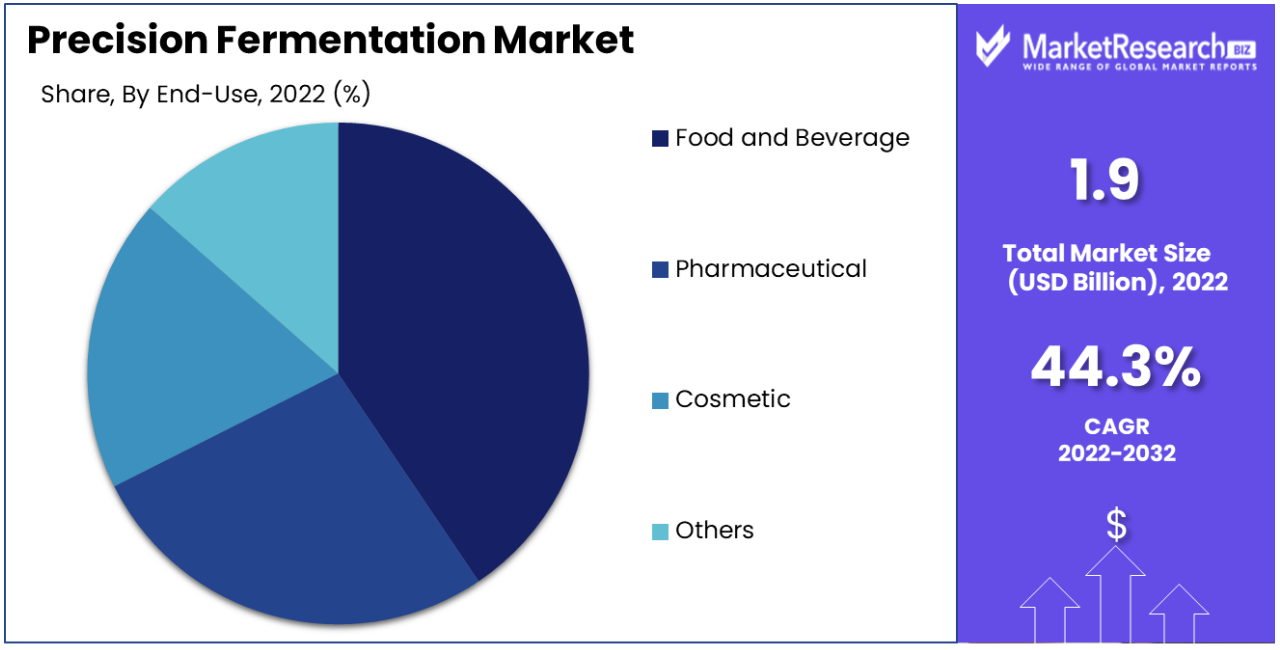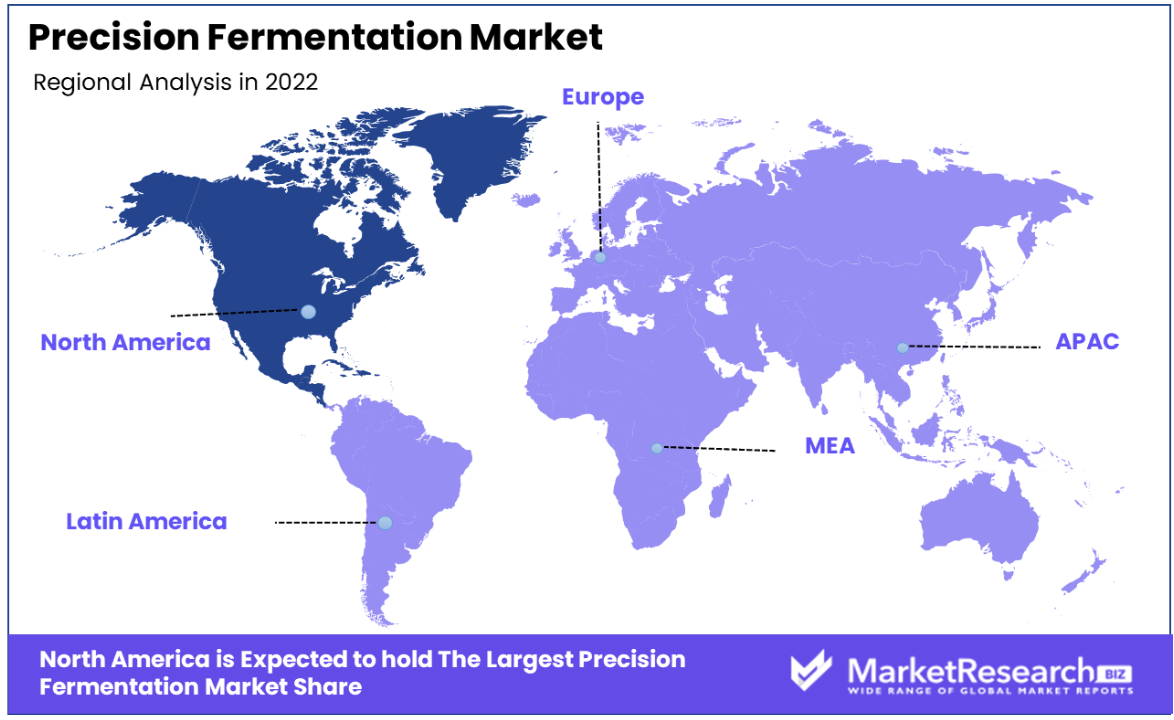
Precision Fermentation Market Report By Application (Meat & Seafood, Dairy Alternatives, Egg Alternatives, Others), By Ingredient (Whey & Casein Protein, Egg White, Collagen Protein, Heme Protein, Enzymes, Others), By Microbe (Yeast, Algae, Fungi, Bacteria), By End User (Food and Beverage, Pharmaceutical, Cosmetic, Others), By Region And Companies - Industry Segment Outlook, Market Assessment, Competition Scenario, Trends, And Forecast 2023-2032
-
41704
-
Oct 2023
-
160
-
-
This report was compiled by Trishita Deb Trishita Deb is an experienced market research and consulting professional with over 7 years of expertise across healthcare, consumer goods, and materials, contributing to over 400 healthcare-related reports. Correspondence Team Lead- Healthcare Linkedin | Detailed Market research Methodology Our methodology involves a mix of primary research, including interviews with leading mental health experts, and secondary research from reputable medical journals and databases. View Detailed Methodology Page
-
Quick Navigation
Report Overview
The global precision fermentation market size was valued at USD 1.9 billion in 2022 and is projected to hit around USD 67.9 billion by 2032, growing at a CAGR of 44.3% over the forecast period 2023 to 2032.

Precision fermentation is expanding as a result of rising consumer demand for eco-friendly, sustainable goods as well as increased understanding of the health advantages of plant-based and cultured alternatives. This innovative method makes it possible to produce a variety of goods, including meat, dairy, and leather, all while greatly lowering the need for large land, water, and other resources. This method is therefore more environmentally friendly and sustainable than traditional farming methods.
Additionally, the field has seen significant advancements in genetic engineering and biotechnology. Precision fermentation procedures are now far more effective thanks to the ability of scientists to develop new strains of microbes and modify their genes. This innovation makes it possible to produce high-quality protein products, such as meat and dairy alternatives, with a small fraction of the resources traditionally needed in traditional animal farming.
The increase in funding in businesses focused on precise fermentation has sped up the creation of cutting-edge goods and technologies. The market's increased competition is encouraging innovation and accelerating the sector's quick growth.
The COVID-19 pandemic sparked a severe worldwide health catastrophe that resonated throughout several industries and was expected to have long-lasting effects on the future course of those businesses. The food and beverage business was among the most severely impacted industries. The complex food supply chain and agribusinesses were interrupted by the installation of social distance measures and the temporary suspension of industrial operations. This crisis caused a substantial imbalance in the food industry's demand and supply sides. Governments all around the world placed limitations that had a significant impact on food production and distribution.
Nevertheless, despite these difficulties, there was an increase in demand for goods made with precision fermented ingredients, driven by a greater knowledge of nutritional choices that are healthful. Notably, the market experienced a spike in sales as a result of the lack of beef and pork. For instance, Impossible Foods, a U.S.-based company, had a startling 500% increase in sales of their Impossible burgers in 2020. In a similar vein, Beyond Meat, another significant participant in the field of precision fermentation, announced a stunning 141% growth in sales in the first quarter of 2020, according to reporting from "The Hill."
Driving Factors
Methods of Production That Are Ecologically Friendly and Sustainable to Improve Market Prospects
Utilizing cutting-edge technology, a wide range of goods, including food, cosmetics, and medications, are produced using microorganisms like yeast and bacteria. Precision fermentation stands out as an eco-friendly and sustainable alternative to traditional methods that depend on resource-intensive operations like agriculture and animal production. It offers a cleaner method of production by dramatically reducing greenhouse gas emissions.
One of the main drivers of the precise fermentation industry is the rise in consumer preference for environmentally friendly, sustainable products. This demand has been sparked by awareness of the negative environmental effects of conventional production techniques, including deforestation, greenhouse gas emissions, and water contamination. The search for alternate protein sources is another key factor propelling the precision fermentation market ahead.
The need for effective and sustainable protein production technologies grows as the world population continues to rise. As a game-changing technology, precision fermentation enables the production of protein-rich goods like meat replacements without the need for animal agriculture. In essence, the expanding market for precision fermentation highlights the growing demand for environmentally friendly and sustainable production methods.
People are Becoming More Aware of Health and Fitness
Health-conscious consumers are increasingly looking for goods they believe to be better for their wellbeing. Precision fermentation stands out from conventional production methods for its health benefits. It makes it possible to produce goods with lower intakes of salt, sugar, and fat, all of which are associated to diseases including diabetes, heart disease, and obesity. Precision fermentation also makes it easier to produce probiotics, which promote immune system and digestive health.
Additionally, it's essential for producing nutrient-dense, plant-based goods that are high in healthy ingredients like antioxidants. These options are frequently seen as better substitutes for conventional animal-based goods, which can have high levels of cholesterol and saturated fat.
The market for precise fermentation is being driven even more by the increase in demand for plant-based goods. A plant-based diet has several health advantages, including a lower risk of developing chronic illnesses like cancer and heart disease. Precision fermentation can be used to create plant-based meat substitutes that are high in protein without the use of animal agriculture. As a result, the growing consumer emphasis on health and wellbeing is a key factor driving the growth of the precision fermentation market.
Alternative Protein Sources Are Needed
There is a need for more effective and sustainable methods of producing protein as the world's population rises. Without the use of animal agriculture, precision fermentation permits the creation of protein-rich goods like meat substitutes.
The market for precision fermentation is being significantly fueled by the increased demand for alternate protein sources.
Restraining Factors
Competition from Traditional Methods
Traditional agricultural practices and well-established supply chains rooted in centuries of tradition pose formidable competition to precision fermentation. Convincing stakeholders to shift from these familiar methods to innovative precision fermentation can be a substantial hurdle, requiring compelling reasons and education.
Scale-up Challenges
Scaling precision fermentation to meet the demands of the commercial market is a multifaceted challenge. It involves overcoming technical complexities, substantial investments in research and development, and rigorous quality control. Achieving cost-effective scaling without compromising product quality is paramount to securing a strong foothold in the market.
Acceptance and perception among consumers
Precision fermentation products' consumer adoption could be difficult, particularly in areas where traditional agriculture and animal rearing are deeply rooted. How swiftly and favourably consumers accept these new products may have an impact on the market's growth.
Growth Opportunities
Increasing product selection and applications
Precision fermentation makes it possible to produce a wide variety of goods, including food, medicines, and even sustainable materials. This adaptability creates a variety of opportunities for innovation and market growth. This growth enables businesses to serve a wider range of customers, diversify their sources of income, and enter new markets, all of which improve profitability and sustainability.
Addressing Environmental Issues
Precision fermentation is a resource-efficient replacement for standard manufacturing techniques that use a lot of energy. It lessens the use of land, water, and energy, as well as reducing greenhouse gas emissions and waste production.
Precision fermentation is therefore a desirable option for consumers, investors, and governments because it is consistent with rising environmental consciousness. It presents businesses as leaders in sustainable business practices.
Strengthening Supply Chain Resilience and Food Security
Precision fermentation lessens reliance on conventional agriculture, which is susceptible to supply chain interruptions and climate change. It provides a more dependable and durable way to produce vital nutrients and food.
This guarantees a steady supply of foods that are high in nutrients, which helps to ensure global food security. It also acts as a safeguard against unanticipated incidents that can interfere with conventional supply systems.
By Application Type
The meat and seafood, dairy alternatives, egg substitutes, and other applications make up the precision fermentation market. The segment that controls the biggest market share among these is meat and seafood. This supremacy results from precision fermentation's ability to produce cultured meats, plant-based meat replacements, and seafood substitutes.
In order to address the growing need for wholesome, sustainable protein sources, these cutting-edge products have the potential to transform the traditional animal agricultural industry. Therefore, the meat and seafood segment's popularity within the precision fermentation industry is boosted by this strong demand. This increase is driven mostly by the need for sustainability, increased nutritional content, economic effectiveness, and animal welfare. Precision fermentation techniques have the potential to change the production of animal-derived proteins and usher in a more ecologically conscious and sustainable food ecology in the meat and seafood industries.
By Ingredient Type
Ingredients for precision fermentation are divided into several categories, including egg white, collagen protein, heme protein, enzymes, and others. The majority of these are made up of whey and casein protein. The widespread usage of whey protein as a dietary supplement, which is favoured by athletes, fitness enthusiasts, and others looking to improve their general health and fitness levels, is responsible for this predominance. Whey protein is known for supporting muscle growth and recovery and is praised for its rich amino acid profile. Precision fermentation increases demand in the precision fermentation market by providing a more efficient and affordable means of generating high-quality whey protein as compared to traditional methods.
The rising popularity of dairy substitutes, the growing emphasis on health and nutrition, technical developments, and more regulatory support are some of the key growth factors for the whey and casein industry.
By Microbe Type
Microbes are essential in the field of precise fermentation. They are divided into four groups: bacteria, yeast, algae, and fungi. The capacity of bacteria to precisely control the growth and production of particular yeast strains designed for a variety of uses puts them in the lead among them. For instance, precision fermentation in the brewing of beer can result in yeast strains that are precisely tuned for a more reliable and high-quality product. Similarly, by creating yeast strains specifically suited for the job, this technology can lead to a more effective and sustainable process for making bread. The domination of bacteria-based precision fermentation is fueled by the rising demand for environmentally friendly goods, scientific advancements in genetic engineering, economic viability, and strong regulatory support.
By End- Use Type
In the global market for precise fermentation, the food and beverage industry has taken the lead. This category includes a variety of items made through fermentation, from fruit-based wines to beer made from cereals. Even potatoes, which are high in starch, can be fermented and distilled to produce alcoholic beverages like gin and vodka. The food and beverage industry is seeing a rise in the use of precision fermentation. When baking bread, for instance, yeast reacts with sugar, flour, and water to consume the sugar and release carbon dioxide, which causes the dough to rise.

Key Market Segments
By Application
- Meat & Seafood
- Dairy Alternatives
- Egg Alternatives
- Others
By Ingredient
- Whey & Casein Protein
- Egg White
- Collagen Protein
- Heme Protein
- Enzymes
- Others
By Microbe
- Yeast
- Algae
- Fungi
- Bacteria
By End- Use
- Food and Beverage
- Pharmaceutical
- Cosmetic
- Others
Latest Trends
Tools for Strain Optimization Using Bioinformatics and Computation
More and more, complex biological systems are being analysed and modelled using bioinformatics methods. This helps in strain performance prediction and genetic change identification for better results.
Researchers may speed up strain development, reduce the need for trial-and-error testing, and ultimately shorten the time it takes for new products to reach the market by utilizing computational methods.
Machine learning (ML) and artificial intelligence (AI) integration
In order to create more controlled and effective processes, AI and ML are being used to design genetic alterations, anticipate microbial behaviour, and optimize fermentation conditions. This invention improves fermentation's accuracy and predictability, lowering production costs and times while facilitating the creation of new, high-value products.
Using a Multi-Omics Approach to Develop Strains
For strain enhancement, it is more popular to use multi-omics approaches, which entail examining numerous biological data sets. Genomics, proteomics, and metabolomics are all included in this. Through a thorough understanding of microbial behaviour provided by this method, genetic alterations can be made more precisely and effectively for improved product yields and quality.
Regional Analysis
In the international market for precise fermentation, North America has risen to the top. This dominance was significantly influenced by the growth in demand for protein-rich products made through precise fermentation, particularly in uses like dairy alternatives, meat extenders, and analogy. Additionally, the expansion of the industry in North America has been accelerated by the expanding popularity of vegetarian diets, which has increased the demand for perfectly fermented egg substitutes.

Precision fermentation is a crucial market in Europe, which is notably led by large contributors like Germany, the United Kingdom, and France. The demand for sustainable and alternative protein sources has significantly increased in the area. Precision fermentation technology is leading the way in manufacturing proteins without the need for extensive animal farming, a method notorious for significantly increasing greenhouse gas emissions and other environmental problems.
Precision fermentation technology is at the forefront of the field in Europe. Precision fermentation is expanding in Europe as a result of consumers' growing awareness of how their food choices affect the environment. As a result, there will be a noticeable increase in demand for sustainable protein sources.
Key Regions and Countries
North America
- US
- Canada
Europe
- Germany
- France
- UK
- Spain
- Italy
- Russia
- Netherland
- Rest of Europe
Asia Pacific
- China
- Japan
- South Korea
- India
- New Zealand
- Singapore
- Thailand
- Vietnam
- Rest of APAC
Latin America
- Brazil
- Mexico
- Rest of Latin America
Middle East & Africa
- South Africa
- Saudi Arabia
- UAE
- Rest of MEA
Key Players Analysis
Key market participants with substantial influence include Perfect Day, Inc., Impossible Foods Inc., Geltor, Every Co., and Motif FoodWorks, Inc. These businesses are actively entering new markets via techniques like growth, new investment, service innovation, and partnerships. In order to explore new areas and gain a competitive edge through partnerships, expansion and acquisition are being used.
Key Players in Precision Fermentation Market
- Perfect Day, Inc. (US)
- Impossible Foods Inc. (US)
- Geltor (US)
- The Every Co. (US)
- Motif FoodWorks, Inc. (US)
- MycoTechnology (US)
- Mycorena (Sweden)
- Eden Brew (Australia)
- Change Foods (US)
- Formo (Germany)
- Remilk Ltd. (Israel)
Recent Developments
- Bel Brands USA and Perfect Day collaborated to launch Nurishh Incredible Dairy Animal Free Cream Cheese Spread Alternative in December 2022.
- Change Foods and KEZAD Group joined together in October 2022 to build an exclusive commercial production plant in Abu Dhabi. The UAE Ministry of Economy's NextGen FDI project will fund this facility's production of their animal-free dairy products.
- Impossible Foods began selling its plant-based Impossible Chicken nuggets in neighborhood supermarkets in Hong Kong in August 2022.
Report Scope
Report Features Description Market Value (2022) US$ 1.9 Bn Forecast Revenue (2032) US$ 67.9 Bn CAGR (2023-2032) 44.3% Base Year for Estimation 2022 Historic Period 2016-2022 Forecast Period 2023-2032 Report Coverage Revenue Forecast, Market Dynamics, COVID-19 Impact, Competitive Landscape, Recent Developments Segments Covered By Application (Meat & Seafood, Dairy Alternatives, Egg Alternatives, Others), By Ingredient (Whey & Casein Protein, Egg White, Collagen Protein, Heme Protein, Enzymes, Others), By Microbe (Yeast, Algae, Fungi, Bacteria), By End User (Food and Beverage, Pharmaceutical, Cosmetic, Others) Regional Analysis North America – The US, Canada, Mexico, Latin America – Brazil, Colombia, Chile, Argentina, Costa Rica, & Rest of Latin America, Eastern Europe – Russia, Poland, The Czech Republic, Greece, Rest of Eastern Europe, Western Europe – Germany, France, The UK, Spain, Italy, Portugal, Ireland, Austria, Switzerland, Benelux, Nordic, Rest of Western Europe, APAC – China, Japan, South Korea, India, Australia & New Zealand, Indonesia, Malaysia, Philippines, Singapore, Thailand, Vietnam, Rest of APAC, Middle East & Africa – Algeria, Egypt, Israel, Kuwait, Nigeria, Saudi Arabia, South Africa, Turkey, United Arab Emirates, Rest of MEA Competitive Landscape Perfect Day, Inc. (US), Impossible Foods Inc. (US), Geltor (US), The Every Co. (US), Motif FoodWorks, Inc. (US), MycoTechnology (US), Mycorena (Sweden), Eden Brew (Australia), Change Foods (US), Formo (Germany), Remilk Ltd. (Israel) Customization Scope Customization for segments, region/country-level will be provided. Moreover, additional customization can be done based on the requirements. Purchase Options We have three licenses to opt for: Single User License, Multi-User License (Up to 5 Users), Corporate Use License (Unlimited User and Printable PDF) -
-
- Perfect Day, Inc. (US)
- Impossible Foods Inc. (US)
- Geltor (US)
- The Every Co. (US)
- Motif FoodWorks, Inc. (US)
- MycoTechnology (US)
- Mycorena (Sweden)
- Eden Brew (Australia)
- Change Foods (US)
- Formo (Germany)
- Remilk Ltd. (Israel)




